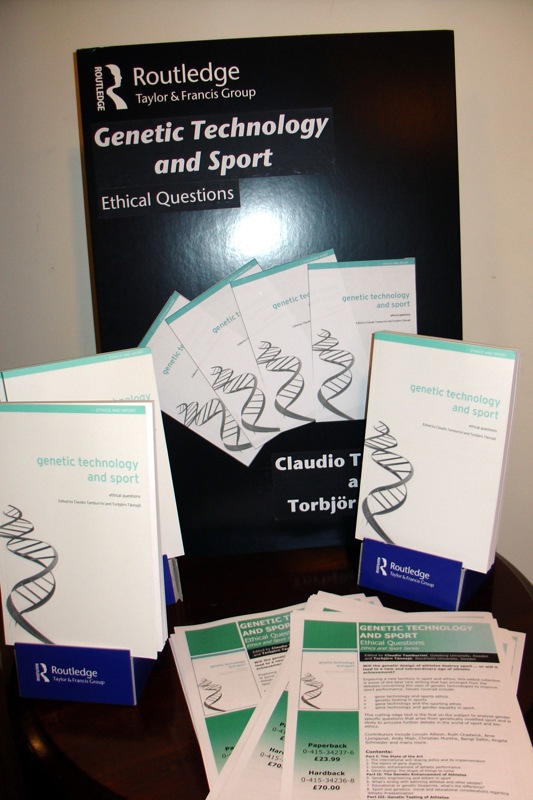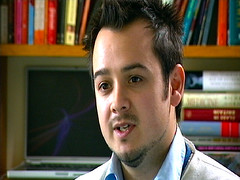Geneticaly Modified Athletes was published in 2004 by Routledge and was translated by the Brazilian publisher Phorta in 2008.
This website provides comprehensive information about the book and the subject of gene doping in sport. To navigate, select 'Genetically Modified Athletes' from the categories in the right hand side of the page.
Reviews
“GMA provides a comprehensive analysis of how genetic technology will be used to enhance sports performance, and how our existing framework for dealing with the problem of sports doping is inadequate on both practical and ethical grounds.”
Prof. Francis Fukuyama, PhD, Johns Hopkins University
“Andy Miah provides an incisive analysis of some of the most difficult issues facing anti-doping authorities. The research is thorough, the argument is perceptive and the conclusions are challenging. Compulsory reading for anyone interested in the future of anti-doping policy."
Prof. Barrie Houlihan, PhD, Loughborough University
[GMA] is a must-read for anyone who considers seriously the future of sports performance, and the position of gene science in establishing an exciting yet level terrain for athletes. It at once calls our attention to social constructionist understandings of the body as a mediator of cultural values, and at the same time, highlights a series of sobering thoughts (at least for social scientists) about sports bodies as genetically determined. Ultimately, the text is invaluable for researchers seeking an advanced institutional analysis of how sports policies regarding the body are developed, promulgated and resisted within sporting institutions, and informed by social processes (that is, the techno-medical development of human bodies) emanating far away from sports fields.
Dr Michael Atkinson, Sport in Society
It will play a vital role in future debates regarding both the ethics of genetic manipulation and, more generally, of doping and performance enhancement. The book should be read and considered carefully by scholars in sports studies, bioethicists, sport-policy makers, coaches, administrators, journalists, and, perhaps most importantly, athletes.
Dr Ian Ritchie, Sociology of Sport Journal.
Miah understands better than the majority of us how tomorrow’s world may look. A glimpse into tomorrow’s world, where the convergence of nanotechnology, biotechnology, information technology and cognitive science-NBIC are becoming daily realities, might make us think that Miah’s opinion is plausible.
Dorin Festeu, European Sports Management Quarterly
Miah's book is a thought-provoking read that raises important questions about sport and society. It is a truly boundary-crossing piece of work, one within which students and scholars in a number of disciplines, from sociology and law to sports studies, will find much material to mine.
Guy Osborn, Times Higher Education Supplement
Whether the notion of genetically modified athletes (or genetically modified humans in general) fills the reader with utopian joy or dystopian dread the book is of interest to a range of disciplines, uniting sports studies with interdisciplinary bioethics and policy discussions.blurred"
Mark Anthony Cutter, Genomics, Society and Policy
"Genetically Modified Athletes can be highly recommended to readers interested in doping, anti-doping policies and sport, but first and foremost bioethics
Dr Inge Kryger Pedersen, Scandinavian J of Medicine and Science in Sports
Genetically Modified Athletes is a book of great importance to both athletics and the greater society. In not taking a firm moral or political position, Miah forces the reader to come to grips with a rapidly changing world in which the line between science and science fiction is blurred"
Melissa Donais, Yale Journal of Public Health
"This extremely interesting book is a must for everyone who takes the ethics in sports seriously....it is compulsory reading for anyone interested in the future of the athletes and the sports in the forthcoming 'era' of genetically engineered sports person."
Fadil Ozyener, MD, PhD, University Medical School, Turkey
for Journal of Sports Science and Medicine
"I believe that Miah's book should be compulsory reading on all Sports Medicine courses because it will promote debate, challenge consensus and make people think.'
Prof. Dr. Andy Smith, FBASES, York and St John College
for British Association of Sport and Exercise Medicine Today
Select list of Academic Citations/Reviews
- Mazanov, J. (2009). "Without bounds: A cosmopolitan research agenda for drugs in sport." Sport in Society 12(3): 411 - 422.
- Mazanov, J. (2009). "Debating the role of drugs in sport: a reader." Sport in Society 12(3): 296 - 312.
- Mazanov, J. and V. McDermott (2009). "The case for a social science of drugs in sport." Sport in Society 12(3): 276 - 295.
- McNamee, M.J. (2008) Sports, Virtues and Vices. Oxon and New York, Routledge.
- Kious, B. M. (2008). "Philosophy on Steroids: why the anti-doping position could use a little enhancement." Theoretical Medicine and Bioethics 29: 213-234.
- Stein, D.J. (2008) Philosophy of Psychopharmacology. Cambridge: Cambridge University Press, p.118.
- More, Pete. (2008) Enhancing Me: The Hope and the Hype of Human Enhancement (Science Museum TechKnow Series), John Wiley & Sons, p.249.
- Christian Lenk, Nils Hoppe & Roberto Andorno (2007) Ethics and Law of Intellectual Property: Current Problems in Politics, Science and Technology (Applied Legal Philosophy), Ashgate, p.84.
- Heinemann Educational Publishers (2007) Perspectives on Science: The History, Philosophy and Ethics of Science.
- Kok, F. (2007) Personalized Nutrition: Principles and Applications, p.167.
- Green R.M. (2007) Babies by Design: The Ethics of Genetic Choice. New Haven: Yale University Press.
- Petróczi, A. (2007). "Attitudes and doping: a structural equation analysis of the relationship between athletes' attitudes, sport orientation and doping behaviour Substance Abuse Treatment, Prevention, and Policy 2(34): doi:10.1186/1747-597X-2-34.
- Davids, K. and J. Baker (2007). "Genes, Environment and Sport Performance: Why the Nature-Nurture Dualism is no Longer Relevant." Sports Medicine 37(11): 961-980.
- Mitchell, C. B., E. D. Pellegrino, et al. (2007). Biotechnology and the Human Good. Washington, DC., Georgetown University Press.
- TWINE, R. (2007) Thinking across species - a critical bioethics approach to enhancement. Theoretical Medicine and Bioethics, 28, 509-523.
- D'ANDREA, A. C. (2006) Federalizing Bioethics. Texas Law Review, 83, 1663.
- Houlihan, B.M.J. (2006) GMA Review, European Physical Education Review, 12(3), 382-384.
- Foddy, B. (2006), 'The ethics of genetic testing in sport', International SportsMed Journal, 7, 3, 216-224.
- Cavanagh, S. L. and H. Sykes (2006). "Transsexual Bodies at the Olympics: The International Olympic Committee's Policy on Transsexual Athletes at the 2004 Athens Summer Games."
Body & Society 12(3): 75-102.
- Parks, J. B., J. Quarterman, et al., Eds. (2006). Contemporary Sport Management (Third Edition). Champaign, IL., Human Kinetics.
- Sheridan, H., B. Pasveer, et al. (2006). "Gene-Talk and Sport-Talk: A View from the Radical Middle Ground." European Journal of Sport Science 6(4): 223-230.
- Culbertson, L. (2006). "Book Review: Genetically Modified Athletes." Journal of the Philosophy of Sport 33(1).
- Tamburrini, C. (2006). "Are Doping Sanctions Justified? A Moral Relativistic View." Sport in Society 9(2): 199-211.
- Atkinson, M. (2006). "Book Review: Genetically Modified Athletes." Sport in Society 9(1): 172-175.
- Shanks, Pete. (2005) Human Genetic Engineering: A Guide for Activists, Skeptics and the Very Perplexed, Nation Books.
- Moates, A. (2005). "Sports Medicine and Ethics." Chisholm Health Ethics Bulletin 11(2): 6-9.
- Pincock, S. (2005). "Gene Doping." The Lancet: Special Supplement on Sport and Medicine 366(S18-S19).
- Belyaletdinov, R.R. (2005) Divnyi novyi sport (Brave New Sports), Chelovek, #5, 169-173 [Russian Academy of Science]
- Jonsson, Kutte. (2005) Cyborgatleterna äh här?! Om genus, “genfuskare” och idrottens hybrider, Idrottsforum, 1-13.
- Ellliott, C. (2005) The Soul of a New Machine: Bioethicists in the Bureaucracy,
Cambridge Quarterly for Healthcare Ethics; 14:4. 379-384.
- Ian Ritchie (2005) Book Review." Sociology of Sport Journal, 22, 239-241.
- Osborn, G. (2005). Uphill race for GM sprinters? Book Review. Times Higher Education Supplement. London: 24.
- Cutter, A. M. (2005). "Book Review." Genomics, Society and Policy 1(2): 94-96.
- Festeu, D. (2005) Book Review, GMA, European Sport Management Quarterly, 5(1), 95-97.
- Cashmore, E. (2005) Making Sense of Sports. London & New York: Routledge
- Donais, M. (2005) Book Review, Yale Journal of Public Health
- Pederson, I. K. (2005). "Book Review." Scandinavian Journal of Medicine and Science in Sports 15: 65-66.
- Jönsson, K. (2004). "Genetiskt modifierade idrottare." Idrottsforum 26 October: http://idrottsforum.org/reviews/items/jonkut_gma.html.
- Hilvoorde, Ivo van. (2004) Topsport en gendoping. Grenzen aan sport, opsporing en geloofwaardigheid. In Krisis. Tijdschrift voor empirische filosofie, 5(4), 5-21.
- Ozyener, F. (2004). "Book Review:." Journal of Sports Science and Medicine 3: 197.
- Hosta, M. (2004). "Book Review of Genetically Modified Athletes." Druzboslovne Razprave 20(46).
- Turner, L. (2004, August 13). Book Review: Ready, Steady…Modify, The Lancet 364:9434, pp.573-4.
- Tooby-Smith, A. (13 July, 2004) Gene Doping, British Association of Sports Medicine Today, 2.
- McNamee, M. J. (2004). "Philosophy of Sport." Nursing Philosophy 5(2): 182-183.
- Córdova, M. Á. (2004). ATLETAS TRANSGÉNICOS: ¿MITO O REALIDAD? Presente: Diario Del Sureste. Mexico: http://www.diariopresente.com.mx/Portal/ArticleView.php?article_id=9919








